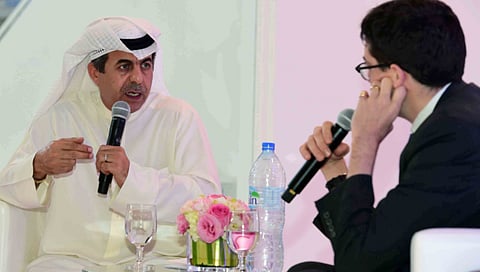Social media ‘a double edged sword’
Gulf News Managing Editor weighs up the pros and cons at Sharjah book fair

Sharjah
Social media is a “double-edged sword” for newspapers and readers alike, Gulf News Managing Editor Mohammed Almezel told the Sharjah International Book Fair (SIBF) on Thursday night. He was speaking at the “Social Media at Gulf News” session during a discussion on ‘Storytelling in Newspapers’ at the Social Media Stand.
Sam Leith, Literary Editor of “The Spectator” moderated the session and asked about challenges faced by print media in the digital era and opportunities social media presents the sector.
Almezel said newspapers are utilising the power of social media, interactive graphics and videos to enhance their content as readers become more mobile and receive more information online. He spoke about how Gulf News strives to promote audience involvement and credible news delivery in the age of social media.
Social media, he said, has changed the way news is reported because any story that breaks is posted on Twitter within minutes, then on websites and finally on printed paper. Readers are also able to post comments and criticise what media covers online instantly. He added that social media has empowered people to express views and share news, which allows information flow both ways. The reader, Almezel said, becomes a source in many instances.
While social media can empower citizen journalism and increase accountability of officials, it can also be abused by rumour mills and propagandists, Almezel said.
Newspapers on their part should use social media to keep readers engaged and informed round the clock, and avoid the tendency to follow an online “frenzy” just for the sake of it, he said.
“People now have been given the enormous power [social media]. They have their views heard everywhere. I think some people use it smartly and some don’t,” he said.
“Social media is a double edged sword that has led to the democratisation of media. But at the same time, when it comes to the distribution of information, anyone can come up and write anything.”
Almezel said separating fact from falsehood has become increasingly difficult in the inexhaustible content spreading on social media. The pressure to break “stories” already doing the rounds on social media makes the job harder.
Leith asked Almezel how editors should deal with “the pressure to get the story out”, especially if it is going viral on social media.
“We at Gulf News tell a story worth telling. We have to respect the sensibility of the reader and common sense. So if it’s not worth telling, it shouldn’t appear anywhere [in print or social media],” Almezel replied. “We shouldn’t look at the social media frenzy, we shouldn’t be a victim. Social media can be intimidating. Sometimes, silly stories go viral and everyone jumps on it. As journalists, we should not fall victim to it.”
He said newspapers have the responsibility and resources to be guardians of accuracy, especially during crises.
“I think there’s no doubt social media played a major part in the Arab uprisings. Even before that, we saw the Facebook revolution in the 2009 Iranian presidential elections… However, as the Arab Spring developed, the amount of information became so large, it was getting difficult to separate credible news from false news. If we search for Syria [on social media], [the information] is overwhelming. How much of the information is accurate or how much is propaganda?”
Readers should — and will — ultimately look up to credible newspapers as their guideline, Almezel added. “Rumours spread very quickly on social media… We journalists still hold the sense of reporting very dear. I think that journalists are looked upon by the general audience, as they are the ones with the skills, resources, and procedures needed to validate a story. I don’t think the general audience want to read a story that’s not validated.”



